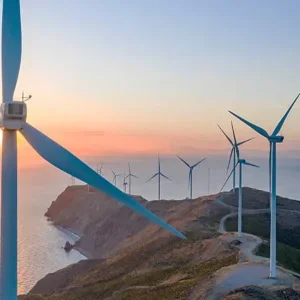
Royal Dutch Shell has today (16 March) stepped up its plans to become a net-zero emissions business, easing concerns that the impact of coronavirus on oil markets might weaken the appetite for clean energy transitions.
The Anglo-Dutch oil giant says it will eliminate all Scope 1 and 2 emissions – greenhouse gases it generates across the entire spectrum of its production operations – by 2050 “at the latest”, in line with the goals of the Paris Agreement.
It will also aim to reduce the net carbon footprint of the products it sells to customers – known as Scope 3 emissions – by 65% by 2050, with an interim target of a 30% reduction by 2035.
The remaining 35%, it says, will be met by engaging with customers to help them cut their own emissions, while pivoting away from carbon-intensive business partnerships over time.
The plan updates a previous climate strategy set out in December 2017, expanding and accelerating the scope of its ambitions to “stay in step with society”.
Shell targets net-zero emissions in line with changing societal expectations
The strategy sets Shell on a similar path to market peers BP and Repsol, which have each outlined their own net-zero frameworks in recent months.
It also eases concerns that the turmoil enveloping oil markets as a result of coronavirus and low commodity prices might deter big energy firms from pursuing low-carbon agendas as they seek to insulate themselves from the market’s volatility.
Shell CEO Ben van Beurden said: “Even at this time of immediate challenge, we must also maintain the focus on the long term.
“Society’s expectations have shifted quickly in the debate around climate change. Shell now needs to go further with our own ambitions, which is why we aim to be a net-zero emissions energy business by 2050 or sooner.
“Society, and our customers, expect nothing less.”
Speaking on a call to investors, he added: “This strategic ambition is all about remaining relevant and resilient in a changing global energy system.
“It is about finding the business value in the energy transition and being a world-class investment case, far into the future.
“The biggest long-term question for an oil and gas business like Shell is the question raised by climate change.”
Wood Mackenzie corporate analyst Luke Parker sees the new commitments as an “evolution” of the 2017 strategy, and one that has been timed to underscore the growing appetite for change in the oil industry, despite its current woes.
He said: “The fact that Shell announced the move now underlines its commitment to make the shift from Big Oil to Big Energy.
“Coronavirus and its fall-out doesn’t change that. If anything, it adds greater weight to the argument.
“Despite immediate cash flow constraints, Shell, and its peers, will emerge from this period more determined to make the shift.”
Shell will work ‘intensely’ with customers to help them eliminate their own emissions
Products such as hydrogen, biofuels and other forms of renewable energy will take on an increasingly prominent role in the company’s portfolio as it seeks to lower its emissions footprint.
It will, however, continue to manufacture and sell fossil fuels, because “society will continue to need some energy products that create emissions for the foreseeable future”.
“This is going to take a lot of work,” said van Beurden. “It will not be easy. Some of the necessary technologies – like hydrogen-powered planes, or zero-emissions ships – do not exist yet.
“And, today, Shell’s business plans will not get us to where we want to be. That means our business plans will have to change over time as society and our customers also will have to change over time.”
As for the bridging the gap between its 65% target for reducing Scope 3 emissions and the net-zero ambition, the oil major says it will work “ever more intensely” with its customers to help them mitigate their own carbon footprints, and pivot towards serving customers that are themselves taking steps to reach net zero.
The chief executive added: “We, as a business that supplies energy, will work within sectors which use energy to establish pathways for them to follow towards net-zero emissions.
“And for those customers who still have emissions as they near 2050, we will work with [them] to find a way to mitigate those emissions.”
Shell targeting a social licence to ‘thrive’ in the energy transition
Oil and gas companies have faced increasing pressure in recent months to accelerate the pace of transitions away from carbon-intensive operations in an effort to tackle the looming climate crisis.
Investor groups and other industry stakeholders have become increasingly vocal on environmental issues, threatening to pull funding from businesses not engaging with climate issues.
Earning a “social licence” to operate will be key to Shell’s ability to survive the energy transition, said van Beurden, because “society’s attitude is shifting fast” – which is “a good thing” because the world is “not moving fast enough right now” to tackle climate change.
“Being in step with society is key,” he told investors. “It is key to maintaining a strong societal licence to operate, and by staying in step with society as it shifts towards a net-zero emissions future, we are also setting ourselves up to thrive through the energy transition.”
Climate-focused investor groups welcome Shell’s new ambition
CEO of the Institutional Investors Group on Climate Change (IIGCC) Stephanie Pfeifer welcomed Shell’s announcement, saying it is “imperative” for the oil and gas industry to play its part in tackling climate change.
She added: “Investors will now look to other energy companies to match, and build on, the welcome ambition Shell is showing.”
Fiona Reynolds, who is a member of the Climate Action 100+ steering committee alongside Pfeifer, and CEO of the Principles for Responsible Investment (PRI) initiative said: “Timely investor action to address the devastating social and economic effects of Covid-19 is essential and we welcome Shell’s significant commitment today to become a net-zero emissions energy business by 2050.
“It’s imperative that companies continue to focus on the long-term impacts of investments on the climate.”






